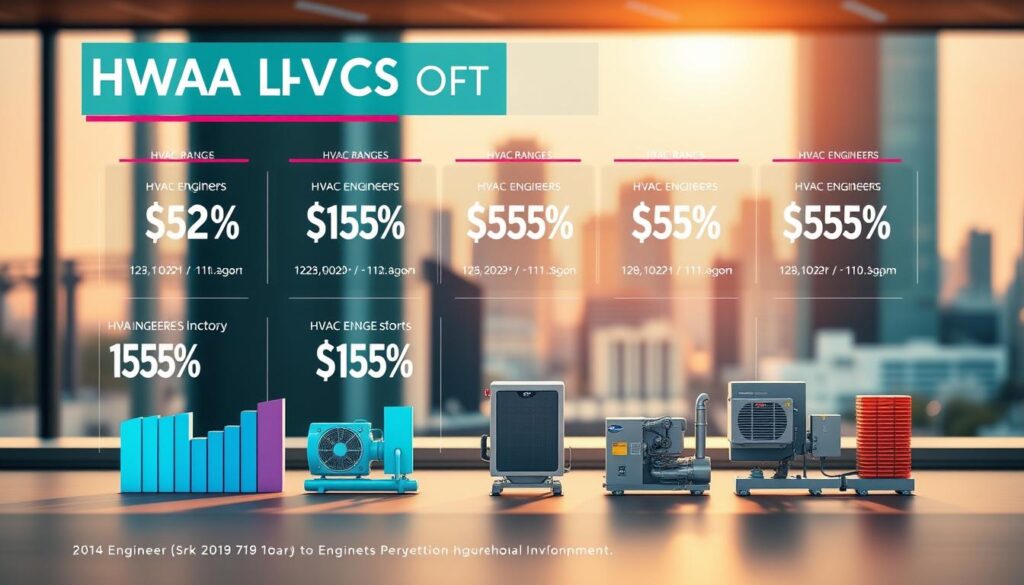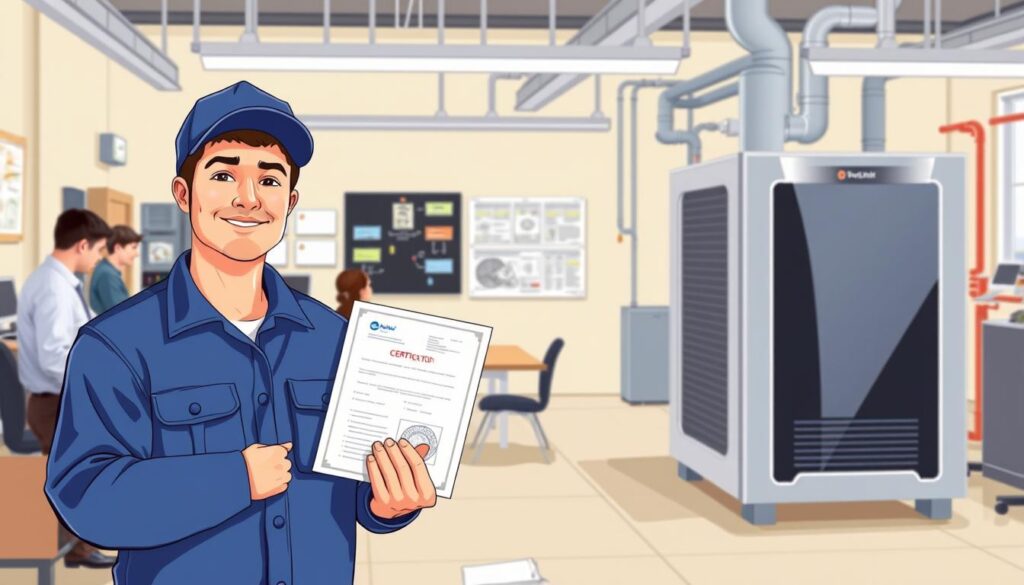Affiliate Disclosure
HVAC Guide Guys is a participant in the Amazon Services LLC Associates Program, an affiliate advertising program designed to provide a means for sites to earn advertising fees by advertising and linking to Amazon.
How Much Do HVAC Engineers Earn? Are you curious about the financial side of HVAC engineering? This field offers both technical challenges and good pay. Knowing how much HVAC engineers make can change your career path.

In 2025, HVAC engineering is a promising field. The average salary for an HVAC Mechanical Engineer is $81,668. This shows how important these professionals are in making our spaces comfortable and efficient.
Exploring HVAC engineer salaries shows a mix of technical skills and good pay. With more demand for skilled HVAC workers, you could have a stable and rewarding career.
Key Takeaways
- HVAC engineers earn an average of $81,668 in 2025
- The field offers strong career growth opportunities
- Salaries vary based on specialization and experience
- Technical skills directly impact earning
- Geographic location affects compensation
Table of Contents
Understanding HVAC Engineer Salary Ranges in 2025
Understanding HVAC salaries means looking at different parts of the income. Your earnings as an HVAC technician depend on many factors. These factors make the job both rewarding and dynamic.
HVAC engineers get a complete compensation package. This package includes several important parts. It rewards their skills, knowledge, and hard work.
Core Base Salary Components
The base salary is the main part of HVAC wages. It includes:
- Annual base salary range: $61,000 – $111,000
- Salary increases based on experience
- Extra pay for special skills
Additional Compensation Opportunities
HVAC engineers can also earn more through different ways:
| Compensation Type | Potential Value |
|---|---|
| Performance Bonuses | 5-15% of base salary |
| Profit Sharing | 2-8% of annual earnings |
| Overtime Pay | 1.5x hourly rate |
Total Compensation Package Insights
Your total earnings are more than just a monthly check. Think about benefits like health insurance and retirement plans. These add to your overall package.
Planning your career and improving your skills can boost your income. This makes HVAC a great choice for both money and personal growth.
How Much Do HVAC Engineers Earn: A Comprehensive Analysis
Your earnings as an HVAC engineer can change a lot. The pay for heating and cooling technicians is quite good. Recent surveys show HVAC engineers get paid well for their skills and knowledge.
To understand salaries, we need to look closely at the field’s economy. HVAC engineers usually make between $55,000 and $95,000 a year. On average, they earn about $73,587 annually. Your pay depends on several things:
- Where you work
- How long you’ve been working
- Any special certifications you have
- The industry you work in
- Your skills
The earnings in HVAC show some patterns. Entry-level jobs start at the lower end of the pay scale. But, those with more experience and certifications can earn much more. Getting good at commercial HVAC or energy-saving tech can also raise your pay.
Investing in continuous professional development can dramatically improve your heating and cooling technician pay trajectory.
There are many ways to grow your income in HVAC engineering. Getting more training, certifications, and skills in new tech can really boost your value and earnings.
Explore Our HVAC Shop
Looking for top-rated HVAC tools, parts, and accessories? Visit our shop and find the perfect solution for your needs.
Visit the ShopCareer Progression and Salary Growth
Your career as an HVAC engineer offers exciting opportunities for growth and higher income. Knowing how salaries increase can help you plan your career.
The HVAC industry has a clear path for career advancement. Your salary will grow as you gain experience and skills.
Entry-Level Earnings
Starting your HVAC engineering career, you can expect good pay. Entry-level jobs usually offer:
- Average starting salary around $54,000 per year
- Opportunities for rapid skill development
- Basic technical responsibilities
Mid-Career Income
As you gain experience, your earning power increases. Mid-career HVAC engineers typically see:
- Increased responsibilities in project management
- Potential for specialization in specific HVAC systems
- Salary ranges between $65,000 and $75,000
Senior-Level Compensation
Experienced HVAC engineers with 10-20 years of expertise earn impressive salaries. Senior-level professionals typically earn:
- Average annual income of $85,000
- Leadership and strategic design roles
- Advanced technical consulting opportunities
Investing in continuous learning and professional certifications can accelerate your career progression and maximize your earning in the HVAC engineering field.
Geographic Variations in HVAC Engineer Salaries
Your salary as an HVAC worker can change a lot based on where you work in the United States. The location you choose greatly affects how much you can earn. Different regions have different salaries.
Several key factors influence regional salary differences:
- Cost of living in metropolitan areas
- Local demand for HVAC services
- Regional economic conditions
- Population density
To help you understand these geographic variations, we’ve compiled salary data for major US regions:
| Region | Average HVAC Salary | Cost of Living Impact |
|---|---|---|
| Northeast | $72,500 | High |
| West Coast | $68,300 | Very High |
| Midwest | $62,100 | Low to Medium |
| Southern States | $58,700 | Low |
Places like New York, San Francisco, and Chicago usually pay more for HVAC work. This is because these cities have more technology and need more services.
Remote work is becoming more common. This could let HVAC workers earn more by working in high-paying areas but living somewhere cheaper. Look into these options to make more money.
Specialization and Its Impact on Earnings
In the world of HVAC engineering, your choice of specialization greatly affects your salary. Different paths in the HVAC field offer unique chances for growth and higher earnings.
To understand hvac professional wages, we must look closely at specific roles. Each area requires unique skills and demand, affecting how much you can earn.
HVAC Controls Engineering
HVAC controls engineers earn the most in the field. They design systems that control building environments. Their main tasks include:
- Developing advanced control strategies
- Implementing energy-efficient automation systems
- Creating complex building management solutions
HVAC Design Engineering
Design engineers are key in creating HVAC system plans. They focus on:
- Creating detailed system layouts
- Ensuring systems work well and efficiently
- Working with architects and construction teams
HVAC Sales Engineering
Sales engineers mix technical skills with sales. They might earn less than others, but they’re vital. They do:
- Explain technical details to clients
- Offer custom HVAC solutions
- Help make sales through product advice
Your choice of specialization can greatly shape your career and earnings in HVAC engineering.
Explore Our HVAC Shop
Looking for top-rated HVAC tools, parts, and accessories? Visit our shop and find the perfect solution for your needs.
Visit the ShopEducation and Certification Impact on HVAC Salaries

Getting the right education and certifications can really boost your hvac technician income. Investing in your skills is a smart move. It helps you earn more and stand out in the HVAC field.
What you study affects how much you can earn. Most HVAC jobs start with a high school diploma. But, getting a higher degree can open up better job opportunities.
- Associate’s Degree in HVAC Technology: Typically 2-year program
- Bachelor’s Degree in Mechanical Engineering: Advanced technical knowledge
- Technical Certifications: Specialized skill enhancement
Certifications can change the game for HVAC pros. Groups like North American Technician Excellence (NATE) and ASHRAE offer these. They show you’re an expert and can raise your pay.
| Certification | Potential Salary Impact | Career Advancement |
|---|---|---|
| NATE Certification | 5-10% Salary Increase | Enhanced Technical Credibility |
| ASHRAE Professional | 7-12% Salary Boost | Advanced Design Opportunities |
| EPA Section 608 Certification | 3-5% Salary Increase | Refrigerant Handling Qualification |
Pro Tip: Keep learning and stay current with HVAC tech. This can help you earn more and find better jobs.
Industry Sectors and Their Pay Scales
HVAC job pay changes a lot based on the industry. Knowing these differences helps match your pay with your work setting. Each field has its own pay and challenges, affecting how much you can earn.
The HVAC world has three main areas, each with its own pay and job chances. Your career path and skills greatly affect your earnings.
Commercial HVAC Engineering
Commercial HVAC engineers work on big projects like offices, hospitals, and malls. Their pay reflects the project’s size and complexity.
- Average annual salary range: $65,000 – $95,000
- Complex system design skills required
- Higher compensation for advanced technical expertise
Residential HVAC Services
Pay for residential HVAC techs varies. You might work for someone or have your own business.
- Typical salary range: $50,000 – $75,000
- Potential for extra income from service contracts
- Good customer service skills boost your pay
Industrial HVAC Engineering
Industrial HVAC pros usually earn the most. This is because they need special skills and work on critical systems.
| Experience Level | Salary Range | Key Requirements |
|---|---|---|
| Entry-Level | $55,000 – $70,000 | Technical certification |
| Mid-Level | $75,000 – $100,000 | Advanced system knowledge |
| Senior-Level | $100,000 – $130,000 | Complex project management |
Your pay depends on your skills, certifications, and ability to keep up with new HVAC tech.
Bonus Structures and Performance Incentives

Getting more from your job as an HVAC contractor isn’t just about your salary. Incentives for performance are key to increasing your earnings. Top HVAC companies have special bonus plans to thank their best workers and keep them motivated.
Bonus plans in the HVAC field usually include a few main types:
- Performance-based bonuses
- Profit sharing programs
- Project completion incentives
- Customer satisfaction rewards
What kind of bonus you get depends on your job and company. Sales-focused HVAC workers often get bonuses based on sales. On the other hand, technical engineers might earn bonuses for efficient and high-quality projects.
“Your ability to exceed performance metrics directly impacts your earnings in the HVAC industry.”
Bonus amounts can vary a lot:
- Entry-level technicians: $1,000 – $3,000 annually
- Mid-career professionals: $3,000 – $8,000 annually
- Senior engineers and managers: $8,000 – $13,000 annually
To increase your chances of getting a bigger bonus, aim to do excellent work. Keep your customers happy and show off your technical skills in HVAC.
Explore Our HVAC Shop
Looking for top-rated HVAC tools, parts, and accessories? Visit our shop and find the perfect solution for your needs.
Visit the ShopFactors Affecting HVAC Engineer Compensation
Figuring out how much HVAC engineers make involves looking at several key factors. It’s not just about technical skills. It’s a mix of many professional aspects.
Experience is a big factor in HVAC engineer salaries. Newbies start with lower pay, while experienced ones get more.
- Professional experience level
- Advanced technical certifications
- Specialized industry knowledge
- Geographic location
- Company size and reputation
Your education also affects your salary. Getting advanced degrees or specialized training boosts your value. Those with master’s degrees or professional engineering licenses often get higher starting salaries.
“In HVAC engineering, continuous learning directly translates to earning more.” – Industry Expert
Industry demand and new tech also play big roles in salaries. New areas like energy-efficient systems and smart buildings offer high pay for skilled engineers.
Where you work also matters a lot. Cities with lots of construction and industry pay more than rural areas.
Conclusion
HVAC engineer salaries are promising, with many chances for growth. Your earnings can change based on your specialization, where you work, and your experience. The field pays well for those who keep learning and improving.
Knowing how to get the best pay in HVAC jobs is key. New engineers start with good salaries. Those with special skills, like in energy-efficient systems, can earn more. Getting advanced certifications and keeping up with new tech is important for making more money.
The HVAC field is always changing, needing more sustainable and smart solutions. To do well, focus on improving your skills, find the right job, and stay up-to-date with new tech. Your hard work, knowledge, and dedication will help you succeed in this field.
HVAC engineers who stay open to new things and keep learning will do best. Making smart choices about your career, education, and who you network with can really help your career grow.

